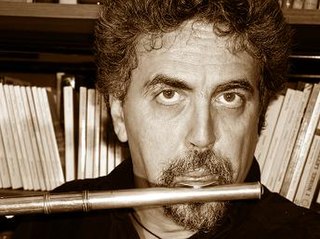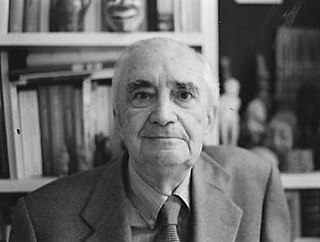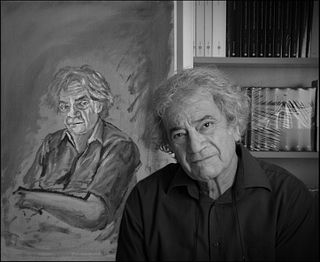Haroldo Eurico Browne de Campos was a Brazilian poet, critic, professor and translator. He is widely regarded as one of the most important figures in Brazilian literature since 1950.

Enzo Nini is a jazz saxophonist and flautist. He was born in San Giorgio a Cremano, Naples, Italy.

The Caiman is a 2006 Italian comedy-drama film directed by Nanni Moretti and starring Silvio Orlando and Margherita Buy. Focusing on Silvio Berlusconi's vicissitudes, it was released just before the beginning of the 2006 elections, in which Berlusconi lost. It was one of the most successful films of 2006 in Italy. It was entered into the 2006 Cannes Film Festival.

Ardengo Soffici was an Italian writer, painter, poet, sculptor and intellectual.

Virgilio Tosi is an Italian documentary filmmaker and historian of early film.

Efstratios Dimitriou, known professionally as Demetrio Stratos, was a Greek lyricist, multi-instrumentalist, music researcher, and co-founder, frontman and lead singer of the Italian progressive rock band Area – International POPular Group.

Jan Lundgren, born on 22 March 1966 in Olofström, Blekinge, and resident in Ystad since 2005, is an internationally active Swedish jazz musician. He is a pianist, composer, and senior lecturer at the Malmö Academy of Music, where he has taught since autumn 1991, as well as the Artistic Director of the Ystad Sweden Jazz Festival, Ystad Winter Piano Fest and Jazzhus Montmartre in Copenhagen. Jan Lundgren is a Steinway Artist and has won many awards. He tours internationally and is signed to the German record label, ACT.
Riccardo Piacentini is an Italian composer and pianist, professor of Composition at the Milan Conservatory.

Nanni Balestrini was an Italian experimental poet, author and visual artist of the Neoavanguardia movement.

Beppe Costa is an Italian poet, novelist and publisher.

Nanni Cagnone is an Italian poet, novelist, essayist and playwright. He debuted as a poet in 1954 and since then has written several books, mostly poetry but also plays and novels, theoretical essays and aphorisms, from The Disabled Youth (1967) to The Oslo Lecture (2008). He is the father of Benedicta Froelich, and is married to Sandra Holt. Currently lives in Bomarzo.
Giovanni Fontana is an Italian poet, performance artist, author and publisher.
Emilio Villa was an Italian poet, visual artist, translator, art critic and Bible scholar. His poems reflected his knowledge of modern and ancient languages, including Italian, French, English, Latin, Greek, Sumerian, and Akkadian.

The Archivio di Nuova Scrittura is a cultural association founded in 1988 in Milan, Italy by art collector Paolo Della Grazia. The archive preserves a large artistic and documentary heritage about any form of artistic expression featuring the use of both the word and the sign. Born from the encounter between Della Grazia and artist Ugo Carrega, in the 1990s the ANS became the main Italian research center on visual poetry, organizing exhibitions, meetings and other cultural events. In 1998 the Archivio di Nuova Scrittura was deposited in part at the Mart in Rovereto and in part at the Museion in Bozen. The artwork section of the ANS includes about 1,600 works by international artists at Mart and about 2,000 at Museion. The ANS archives preserve, apart from the internal archive of the association, the Fraccaro-Carrega fonds, containing the papers of collector Marco Fraccaro and visual poet Ugo Carrega. The library section, preserved at Mart, contains more than 18,000 volumes, among them 600 artist's books and hundreds of futurist first editions, and 600 art magazines including about 300 international artist's magazines.
alfabeta was a monthly cultural and literary magazine published between 1979 and 1988 in Milan, Italy. The magazine was the cultural landmark in the country during its existence.

Alfredo Vernacotola was an Italian poet and writer.
Francesco Leonetti was an Italian poet, novelist, art critic, teacher and political activist.

A pan-Romance language or Romance interlanguage is a codified linguistic variety which synthesizes the variation of the Romance languages and is representative of these as a whole. It can be seen as a standard language proposal for the whole language family but is generally considered a zonal constructed language because it's the result of intense codification. Zonal languages are, according to interlinguist Detlev Blanke, constructed languages which "arise by choosing or mixing linguistic elements in a language group".

Virgil Schönbeck, known by his pen name Virgilio Giotti, was an Italian poet writing both in Italian and in the Triestine dialect. Giotti's poetry "which is not so much linked to the vernacular tradition as to contemporary poetry in the Italian language, from Pascoli and the Crepuscolari to hermeticism, uses the dialect to give more intimate vibration to its lyrical motifs, now inspired by a loving or familiar, serene or painful intimacy, now by nature, by the landscape, by the minute life of his city; in forms that from the musicality of the canzonetta approach more and more, and with ever greater grace, an epigrammatic essentiality."
Tommaso Ragno is an Italian stage and film actor.












